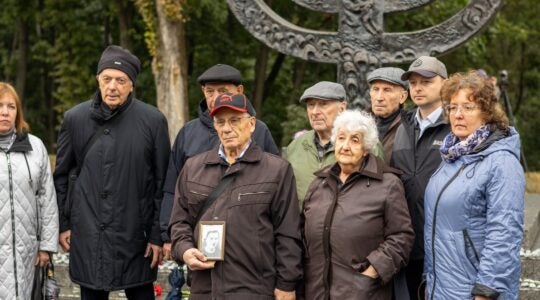ASHGABAT, Turkmenistan (JTA) – Lyuba Garbuzova, a 46-year-old grandmother of two, was arrested late last year and detained by authorities in Uzbekistan on charges of smuggling cash across the border into this Central Asian republic.The money, provided by foreign Jews, represented six months worth of food and medical donations intended to care for the 1,200 people in Turkmenistan’s mostly elderly Jewish community.After spending two months under virtual house arrest in Uzbekistan while facing a six-year prison sentence, Garbuzova was acquitted of all charges and allowed to return to Ashgabat. She was not dissuaded by the ordeal.”I have one simple goal,” she says: “Send people to live in Israel.”Her level of defiance isn’t surprising given who Garbuzova is and what she does for a Jewish community facing perhaps the most severe restrictions in the former Soviet Union. Garbuzova is the cornerstone of a community operating without a rabbi or synagogue, under the glaring eye of a totalitarian regime, and trying to take care of its poorest and neediest with just the intermittent charity sent by friends and concerned Jews abroad.For Garbuzova, an energetic woman with bright eyes and a quick wit, no task is too big or too small. She delivers donated food packages to almost every city in Turkmenistan, driving across the punishing terrain of a country that is 80 percent uninhabited desert. She holds Shabbat services, teaching young attendees the prayers so they can perform them. But Garbuzova considers her most important task to be helping Jews immigrate to Israel. During decades of communism, Jews across the Soviet Union often changed their surnames in an attempt to avoid anti-Semitism. Now, because the archives remain closed under the current Turkmen regime, it can be nearly impossible to provide the proof of one’s Jewish roots required for aliyah to Israel.So what do they do in the meantime?”We sit and we wait,” Garbuzova says.The measure of her success can be seen in the dwindling number of Jews left in Turkmenistan.In 1989, the last year a Soviet census was taken, there were 2,500. That number has been slashed by more than half. “I’ve sent so many, there’s hardly any left,” Garbuzova says, her pride barely contained behind a thin smile.Born to nonreligious parents in the Ukrainian city of Cherkasy, it wasn’t until she moved to Ashgabat in 1978 with her ethnically Turkmen husband that she began the process of rediscovering her heritage. Six years ago, community leader Iosif Schlochitsky asked Garbuzova, who had wanted to be a lawyer but feared failing her clients, to take over the community’s piecemeal charity operation.Mere blocks from the sprawling ministerial buildings that comprise the heart of modern Ashgabat, the Jewish community’s office stands worlds apart.Located in an aging residential block at the end of the myriad back alleys of the city’s old quarter, one would be hard-pressed to find it save for three faint chalk outlines on the steel door that bars the way: a Star of David, a flower and a heart.Once inside, the compromises necessitated by the state are immediately visible. Between the two Israeli flags hangs the ubiquitous photo of Saparmurat Niyazov, the country’s late president and self-declared “father of all Turkmen.” Beside the holy books is a copy of “The Ruhnama,” Niyazov’s rambling diatribe in poetic meter on his and his people’s divinity.How does Garbuzova deal with the seeming inconsistency of displaying a photo of the man responsible for the country’s religious laws, under which Judaism is illegal? With a sharp sense of humor and a bit of creativity.”You can see that the Israeli flags are cloth, but he is on paper,” she says with a laugh.Much of Garbuzova’s success has been due to this ability to work peacefully on both sides of the divide.There is little of the firebrand in Garbuzova, no fiery rhetoric about mistreatment of Jews, but rather the cool calculation of a seasoned agent willing to do what it takes to make the best of an untenable situation.The state intelligence services – still referred to by locals as the KGB – know that Garbuzova is operating an unregistered operation from her humble offices, but she has been able to avoid any confrontation that might jeopardize her work.Garbuzova insists that nothing like the anti-Semitism she encountered in her native Ukraine exists in Turkmenistan, but rather that the Jews are just one of the minorities, including ethnic Russians, who have been pushed aside by the state’s preferential policies toward ethnic Turkmen.Still, she’s aware of the particular double standard facing Turkmenistan’s Jews. “Under the Soviet Union we were like one big family,” she says, but now “there’s a church, there are mosques. What’s wrong with having a synagogue?” Her office must serve as a de facto synagogue and Sunday school, as well as a dozen other things. “They become a family here,” Garbuzova says of the community members. The children who flood her offices refer to her as “mom,” and she in turn calls them her children.But she’s aware that she won’t be able to stay in Turkmenistan forever; nor does she want to.When her youngest daughter, Masha, 17, finishes high school next year, the two will finally go to join Garbuzova’s two older children in Israel. She wants opportunities for her daughter that don’t exist in Ashgabat. So Garbuzova is training her successor. “There’s no future for them here,” she says of Turkmenistan Jews. “They don’t have the right last name.”
JTA has documented Jewish history in real-time for over a century. Keep our journalism strong by joining us in supporting independent, award-winning reporting.





